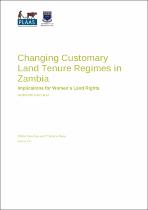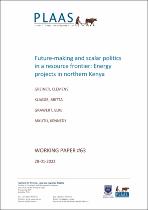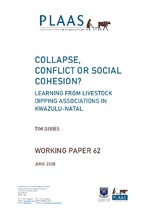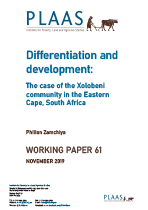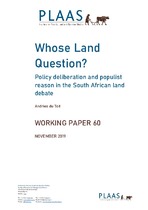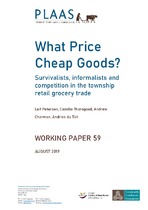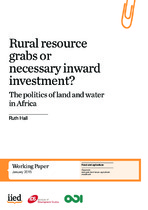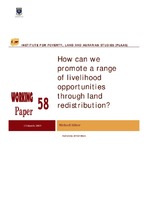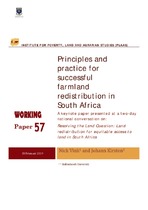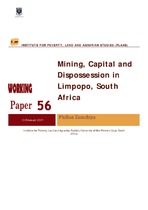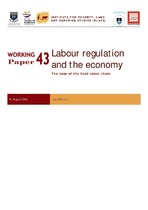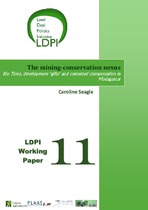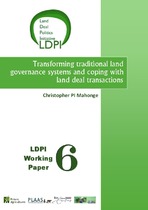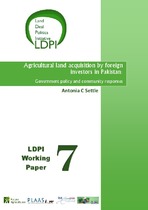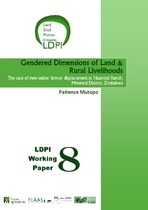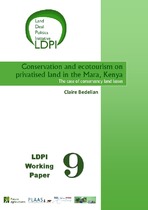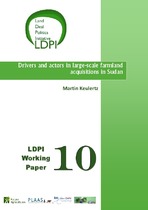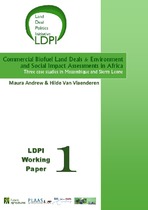Working Papers
Browse by
Recent Submissions
-
Digital tech in African agriculture: the case of German actors
(Institute for Poverty, Land and Agrarian Studies, 2024)This study examines German actors involved in the digitalisation of agriculture in Africa. In order to understand the underlying structures, a typology was developed on the basis of literature. This typology was then applied ... -
Changing customary land tenure regimes in Zambia, implications for women’s land rights
(Institute for Poverty Land and Agrarian Studies (PLAAS), 2023-03)This paper argues that the formalisation of customary land through a rural certification programme in Nyimba District, Zambia, has triggered the establishment of a new tenure regime that transcends the dualism between ... -
The Land and Its People: the land question and the South African political order
(Institute for Poverty Land and Agrarian Studies (PLAAS), 2023-03)This paper examines the disjuncture between the discourses of policy deliberation and contentious politics in debates about ‘the land question’ in South Africa. It argues that the South African land debate as it unfolds ... -
Future-making and scalar politics in a resource frontier: Energy projects in northern Kenya
(Institute for Poverty Land and Agrarian Studies (PLAAS), 2022-01-28)This contribution explores conflicts in the context of energy-related investments and infrastructure projects in Kenya’s arid and semiarid north. Over the past decade or so this historically marginalised region has turned ... -
Collapse, conflict or social cohesion? Learning from livestock dipping associations in Kwazulu-Natal
(2020-06-29)This working paper is about the revival of communal cattle dipping in post-apartheid KwaZulu-Natal, which has improved animal healthcare and strengthened the livelihoods of the black rural households that keep cattle in ... -
Differentiation and development: The case of the Xolobeni community in the Eastern Cape, South Africa
(PLAAS, 2019-11-15)Most agrarian scholars argue that long historic processes of colonialism, capitalist development and implementation of neo-liberal structural policies in Sub-Saharan Africa have resulted in deagrarianisation and its sub-genre ... -
Whose Land Question? Policy deliberation and populist reason in the South African land debate
(PLAAS, 2019-11)On 4 and 5 February 2019, the Institute for Poverty, Land and Agrarian Studies (PLAAS), along with colleagues from the Universities of Fort Hare and of Rhodes, hosted a national conference entitled Resolving the Land ... -
What price cheap goods? Survivalists, informalists and competition in the township retail grocery trade
(PLAAS, 2019-08-31)About 54% of South Africa’s township microenterprises trade in food or drink. More than two-thirds of these are grocery retail businesses in the form of spaza shops and smaller ‘house shops’. These are the predominant ... -
Rural resource grabs or necessary inward investment? The politics of land and water in Africa
(International Institute for Environment and Development, 2015)What has happened since the furore broke over the corporate land rush in Africa? Field-based research has exposed new realities that challenge the linear suggestions of a ‘grab’. As the process unfolds and our understanding ... -
How can we promote a range of livelihood opportunities through land redistribution?
(Institute for Poverty Land and Agrarian Studies (PLAAS), 2019)This position paper sketches an approach to improving land redistribution in South Africa in which the broad aim is to use redistribution to create a range of livelihood opportunities, in meaningful numbers, in proportion ... -
Principles and practice for successful farmland redistribution in South Africa
(Institute for Poverty Land and Agrarian Studies (PLAAS), 2019)The current debate on land reform in South Africa is unnecessarily polarised between those who believe that the market has failed to deliver, and those who believe that the bureaucracy has failed to deliver. Instead, we ... -
Mining, capital and dispossession in Limpopo, South Africa
(Institute for Poverty Land and Agrarian Studies (PLAAS), 2019)This Working Paper explains the processes by which land, water and other natural resources were seized, and their previous users dispossessed, for the purposes of capital accumulation by Ivanplats platinum mining company ... -
Labour regulation and the economy: The case of the food value chain
(Institute for Poverty Land and Agrarian Studies (PLAAS), 2016)Contrary to a popular narrative which seeks to attribute the country’s economic ills to labour legislation, this paper argues that the role of law in relation to the economy is constitutive, and that labour can also not ... -
The mining-conservation nexus: Rio Tinto, development ‘gifts’ and contested compensation in Madagascar
(Institute for Poverty, Land and Agrarian Studies, University of the Western Cape, 2011)This paper traces a genealogy of land access and legitimisation strategies culminating in the recent convergence of multinational mining and conservation in southeast Madagascar. Drawing on empirical research carried out ... -
Transforming traditional land governance systems and coping with land deal transactions
(Institute for Poverty, Land and Agrarian Studies, University of the Western Cape, 2012)This study aimed to gain insight into how land deals have affected traditional Tanzanian land-based interactions and networks, and what coping mechanisms those affected have deployed. Case studies of land deal transactions ... -
Agricultural land acquisition by foreign investors in Pakistan: Government policy and community responses
(Institute for Poverty, Land and Agrarian Studies, University of the Western Cape, 2012)This paper explores the Pakistani government’s 2009 agricultural investment policy package — a response to increasing foreign investor interest in agricultural land — and considers the likely implications for local communities. ... -
Gendered dimensions of land and rural livelihoods: The case of new settler farmer displacement at Nuanetsi Ranch, Mwenezi District, Zimbabwe
(Institute for Poverty, Land and Agrarian Studies, University of the Western Cape, 2012)Nuanetsi Ranch had been invaded by villagers from different parts of Mwenezi, Chiredzi and Chivi communal areas since 2000. In February 2010, the government announced that the settlers had to be removed and resettled in ... -
Conservation and ecotourism on privatised land in the Mara, Kenya: The case of conservancy land leases
(Institute for Poverty, Land and Agrarian Studies, University of the Western Cape, 2012)This paper investigates private sector investment in conservation and ecotourism through conservancy land leases in the Mara region of Kenya. In a recent and growing tourism development, groups of Maasai landowners are ... -
Drivers and actors in large-scale farmland acquisitions in Sudan
(Institute for Poverty, Land and Agrarian Studies, University of the Western Cape, 2012)This study analyses the political, economic and social impacts of the land and ‘virtual water’ grab in Southern Sudan. The ‘virtual water’ concept, which explains the absence of water wars through water embedded in ... -
Commercial biofuel land deals & environment and social impact assessments in Africa: Three case studies in Mozambique and Sierra Leone
(Institute for Poverty, Land and Agrarian Studies, University of the Western Cape, 2011)The rapid increase in attempts by foreign investors to acquire large tracts of land in Africa for biofuel developments has generated substantial concern about their potential negative impact on the communities living in ...


